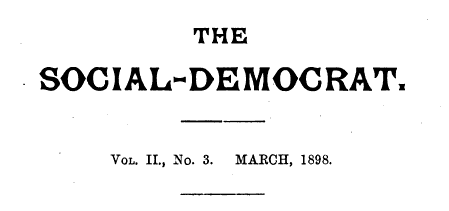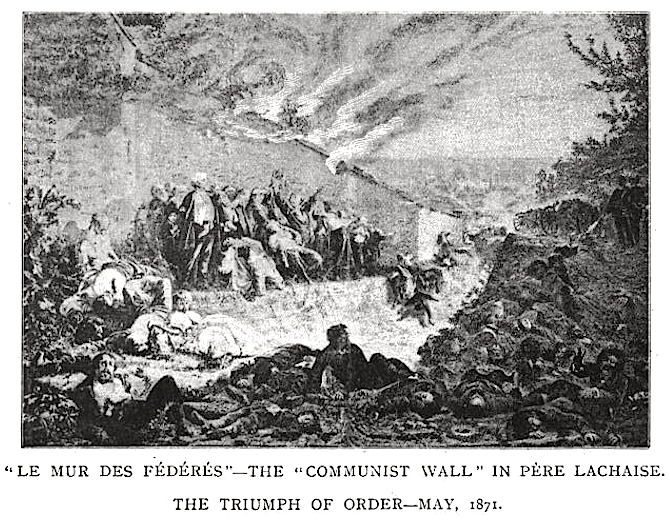C’est la lutte finale
Groupons-nous et demain
L’Internationale
Sera le genre humain.
-Eugène Pottier – Paris, June 1871
Hellraisers Journal, Thursday March 31, 1898
Paris Commune Celebrated Annually by Socialists
From The Social Democrat of March 1898:
THE COMMUNE OF PARIS.
The 18th of March, the anniversary of the Paris Commune, is annually celebrated by Socialists throughout the world. The Commune of Paris is an event unique in history. It was the first working-class government that the world had ever seen. For the first time the working people had seized the reins of government, and taken into their hands the administration of a great city. No wonder the possessing classes were alarmed; no wonder all the forces of “respectability,” of reaction and obscurantism, rallied to the government of the “little man,” Theirs, and his gang of Imperialist mouchards and Royalist ruffians at Versailles. The revolution of the Parisian proletariat was not a mere political movement, it was a menace to all those interests which live and thrive by the enslavement, the exploitation, and the plunder of the workers.
The history of this epoch-marking insurrection is an oft-told tale. Who, among Socialists, does not know of the desertion of Paris by the reactionary Assembly; of the measures for disarming the Parisian National Guards; of the attempted seizure of the guns on the heights of Montmartre in the morning of the 18th of March; how that attempt was frustrated, and how the troops sent to carry it out fraternised with the National Guards, and shot the officer who ordered them to fire upon the people?
The attempt to disarm them in the interest of reaction was followed by a general rally of the National Guards and the withdrawal of the regular troops. By the evening of the day the National Guards were masters of Paris, and the morning of the 19th of March saw the Red Flag floating on the Hotel de Ville. The Central Committee of the National Guard provisionally took charge of the administrative powers, and with the mayors, who at first offered some difficulty, arranged for the election of a Communal Government. The election took place on Sunday, March 26, and on the following day the inauguration of the Commune was celebrated with great popular rejoicing.
From that time on, for two months the Commune, the freely elected Government of the organised workmen of Paris, was the supreme authority in the city. During that two months, as admitted by friend and foe alike, Paris was better administered and freer from vice and crime than at any time before or since. Departments of victualling, of municipal services, of finance, of war, of public safety, of justice, of external affairs, of education, and of labour were organised, and, confronted with tremendous difficulties; harrassed by spies and dissentients within and war without, the Commune presented an admirable example of what a working class administration might accomplish. Theisz, a workman, was placed in charge of the Post Office, which he organised most efficiently; the wages of the employees being raised and their hours of work shortened. Camelinat, a bronze worker, was in charge of the mint. The crucial reforms introduced by these two men into their several departments remain as evidence of their organising ability even to this day. Jourde, clerk and accountant, was at the head of the Commission of Finance, which he administered with a sagacity as great as his modesty was remarkable.
The hospital system was entirely re-organised by other workmen. The heads of these departments received no more than their ordinary workman’s wages.
But the victories of March were followed by the defeat and butchery of May. The establishment of the Commune was a menace to the existing social order, and must be crushed at all costs. The hated enemies of France, “les Prussiens,” were welcomed as allies by the infamous Thiers and his fellow cut-throats of Versailles in the congenial work of slaughtering the proletarians of Paris. Over and over again attempts were made to effect an arrangement with the Assembly at Versailles, but the Royalist and Imperialist reactionaries there hated and feared the Commune, and nothing but the crushing of Paris, and the massacre of her sons and daughters would satisfy them. The military business of the Commune was the worst side of its administration, and the defence was never properly organised. On the 21st of May the Versaillese troops forced an entrance, and by the end of the month the Commune had perished in a perfect sea of blood and fire. For a fortnight Paris was a veritable shambles; for fully a week after the fighting was practically over, men, women and children were systematically butchered in crowds; put up against the wall and shot down with chassepot and mitrailleuse, hacked to pieces with sabres, or stabbed to death with bayonets Altogether not less than 35,000 men, women and children were sacrificed to the vengeance and fury of the classes who saw their interests temporarily threatened by the working class revolution of the Commune of Paris.
But on the 18th of March we celebrate the victory of the Commune, not its downfall. The former stands as a beacon of hope for us—unique in history. We hope one day to be able to avenge the latter.
This year, too, the celebration of the 18th of March has a special significance. It is the fiftieth anniversary of the Revolution of 1848, and, moreover, our veteran comrade, Liebknecht, leaves his prison on that day.
[Emphasis added.]
SOURCE
The Social Democrat, Volume 2
-Jan to Dec 1898
Twentieth Century Press, 1898
https://books.google.com/books?id=0isrAAAAYAAJ
The Social-Democrat of March 1898
“The Commune of Paris”
https://play.google.com/books/reader?id=0isrAAAAYAAJ&printsec=frontcover&output=reader&hl=en&pg=GBS.PA67
IMAGES
ScDem Mar 1898
https://play.google.com/books/reader?id=0isrAAAAYAAJ&printsec=frontcover&output=reader&hl=en&pg=GBS.PA67
Triumph of Order over Paris Commune May 1871, ScDem Mar 1898
https://play.google.com/books/reader?id=0isrAAAAYAAJ&printsec=frontcover&output=reader&hl=en&pg=GBS.PA66
See also:
Paris Commune
https://en.wikipedia.org/wiki/Paris_Commune
The Internationale
Written by: Eugène Pottier – Paris, June 1871
Music by: Pierre Degeyter – 1888
https://www.marxists.org/history/ussr/sounds/lyrics/international.htm
Albert Theisz
https://fr.wikipedia.org/wiki/Albert_Theisz
Zéphyrin Camélinat
https://en.wikipedia.org/wiki/Z%C3%A9phyrin_Cam%C3%A9linat
François Jourde
https://fr.wikipedia.org/wiki/Fran%C3%A7ois_Jourde
Revolutions of 1848
https://en.wikipedia.org/wiki/Revolutions_of_1848
Wilhelm Liebknecht
https://en.wikipedia.org/wiki/Wilhelm_Liebknecht


